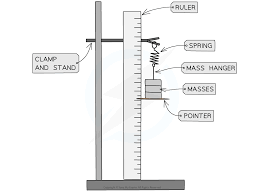Investigating Springs
You can investigate the link between force and extension
Set up the apparatus and make sure you can extra masses, then measure the mass of each and calculate the weight using W=mg 
- Measure the natural length of the spring with a millimetre ruler clamped to the stand. Make sure you take the reading at eye level and add a marker to the bottom of the spring to make the reading more accurate
- Add a mass to the spring and allow it to come to rest. Record the mass and measure the new length of the spring. The extension is the change in length
- Repeat this process until you have enough measurements, no fewer than 6
- Plot a force-extension graph of your results. It will only start to curve if you exceed the limit of proportionality.
You can work out energy stored for linear relationships
- As long as a spring is not stretched past its limit of proportionality, the work done in stretching a spring can be found using: Ee=1/2ke2
- For elastic deformation, this formula can be sued to calculate the energy stored in a spring’s elastic potential energy store. It’s also the energy transferred to the spring as it’s deformed